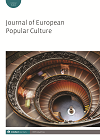-
oa What is the ‘hero affect?’ Outlining a research perspective on the affective role of heroizations in contemporary European popular culture
- Source: Journal of European Popular Culture, Volume 11, Issue 2, Oct 2020, p. 85 - 90
-
- 01 Oct 2020
- Previous Article
- Table of Contents
- Next Article
Preview this article:






What is the ‘hero affect?’ Outlining a research perspective on the affective role of heroizations in contemporary European popular culture, Page 1 of 1
< Previous page Next page > /docserver/preview/fulltext/jepc/11/2/jepc.11.2.85_Falkenhayner-1.gif
There is no abstract available.
© 2020 Intellect Ltd
This article is Open Access under the terms of the Creative Commons Attribution-NonCommercial 4.0 International licence (CC BY-NC), which allows users to copy, distribute, transmit and adapt the article, as long as the author is attributed and the article is not used for commercial purposes. To view a copy of the licence, visit https://creativecommons.org/licenses/by-nc/4.0/



